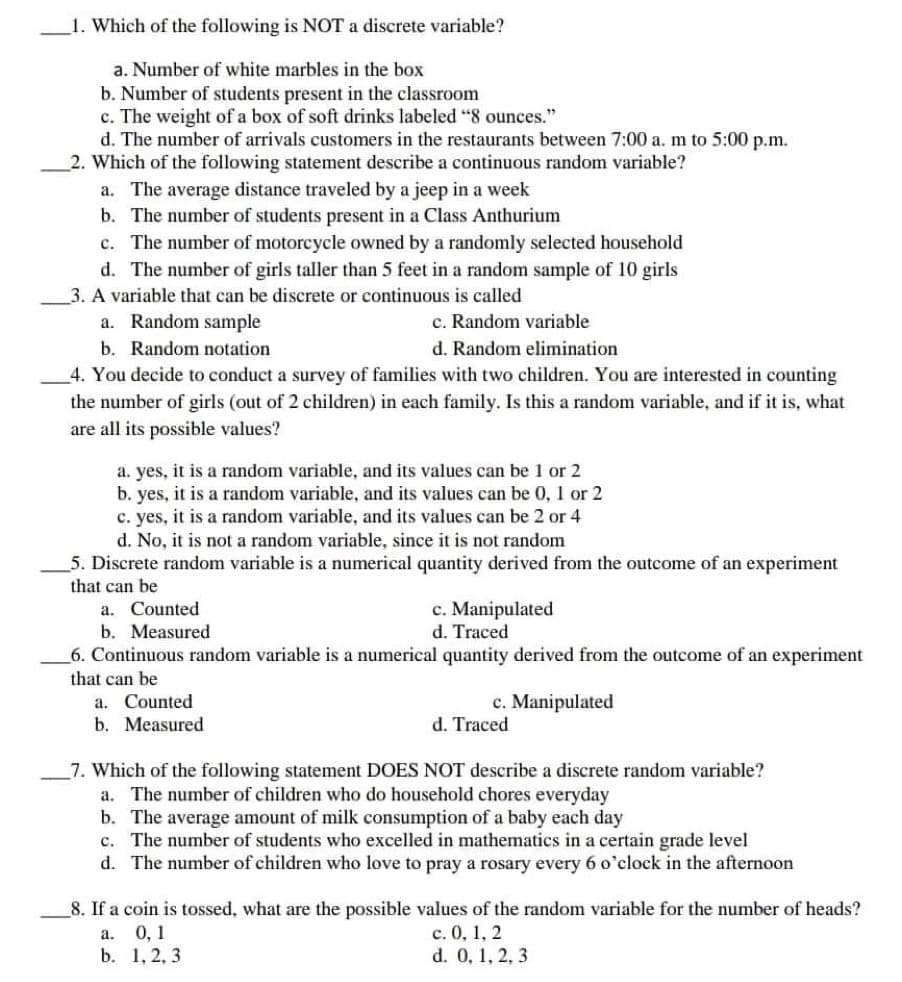6. Continuous random variable is a numerical quantity derived from the outcome of an experiment that can be a. Counted c. Manipulated b. Measured d. Traced 7. Which of the following statement DOES NOT describe a discrete random variable? a. The number of children who do household chores everyday b. The average amount of milk consumption of a baby each day c. The number of students who excelled in mathematics in a certain grade level d. The number of children who love to pray a rosary every 6 o'clock in the afternoon 8. If a coin is tossed, what are the possible values of the random variable for the number of heads? a. 0,1 c. 0, 1, 2 b. 1, 2, 3 d. 0, 1, 2, 3
6. Continuous random variable is a numerical quantity derived from the outcome of an experiment that can be a. Counted c. Manipulated b. Measured d. Traced 7. Which of the following statement DOES NOT describe a discrete random variable? a. The number of children who do household chores everyday b. The average amount of milk consumption of a baby each day c. The number of students who excelled in mathematics in a certain grade level d. The number of children who love to pray a rosary every 6 o'clock in the afternoon 8. If a coin is tossed, what are the possible values of the random variable for the number of heads? a. 0,1 c. 0, 1, 2 b. 1, 2, 3 d. 0, 1, 2, 3
Glencoe Algebra 1, Student Edition, 9780079039897, 0079039898, 2018
18th Edition
ISBN:9780079039897
Author:Carter
Publisher:Carter
Chapter10: Statistics
Section10.4: Distributions Of Data
Problem 19PFA
Related questions
Question
PLEASE ANSWER THE LAST 3 SUBPARTS, ITEMS 6-8

Transcribed Image Text:1. Which of the following is NOT a discrete variable?
a. Number of white marbles in the box
b. Number of students present in the classroom
c. The weight of a box of soft drinks labeled "8 ounces."
d. The number of arrivals customers in the restaurants between 7:00 a. m to 5:00 p.m.
2. Which of the following statement describe a continuous random variable?
a. The average distance traveled by a jeep in a week
b. The number of students present in a Class Anthurium
c. The number of motorcycle owned by a randomly selected household
d. The number of girls taller than 5 feet in a random sample of 10 girls
3. A variable that can be discrete or continuous is called
a. Random sample
c. Random variable
d. Random elimination
b.
Random notation
4. You decide to conduct a survey of families with two children. You are interested in counting
the number of girls (out of 2 children) in each family. Is this a random variable, and if it is, what
are all its possible values?
a. yes, it is a random variable, and its values can be 1 or 2
b. yes, it is a random variable, and its values can be 0, 1 or 2
c. yes, it is a random variable, and its values can be 2 or 4
d. No, it is not a random variable, since it is not random
5. Discrete random variable is a numerical quantity derived from the outcome of an experiment
that can be
a. Counted
c. Manipulated
d. Traced
b. Measured
6. Continuous random variable is a numerical quantity derived from the outcome of an experiment
that can be
a. Counted
c. Manipulated
b. Measured
d. Traced
7. Which of the following statement DOES NOT describe a discrete random variable?
a. The number of children who do household chores everyday
b. The average amount of milk consumption of a baby each day
c. The number of students who excelled in mathematics in a certain grade level
d. The number of children who love to pray a rosary every 6 o'clock in the afternoon
8. If a coin is tossed, what are the possible values of the random variable for the number of heads?
a. 0,1
c. 0, 1, 2
b. 1,2,3
d. 0, 1, 2, 3
Expert Solution
This question has been solved!
Explore an expertly crafted, step-by-step solution for a thorough understanding of key concepts.
Step by step
Solved in 4 steps

Recommended textbooks for you

Glencoe Algebra 1, Student Edition, 9780079039897…
Algebra
ISBN:
9780079039897
Author:
Carter
Publisher:
McGraw Hill

Glencoe Algebra 1, Student Edition, 9780079039897…
Algebra
ISBN:
9780079039897
Author:
Carter
Publisher:
McGraw Hill